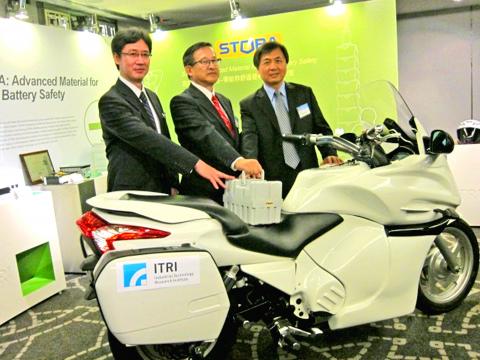The Industrial Technology Research Institute (ITRI, 工研院) yesterday signed a NT$100 million (US$3.28 million) technology licensing agreement with Taiwan Mitsui Chemicals Inc (亞太三井化學) to produce safer lithium-ion batteries.
Taiwan Mitsui Chemicals Inc is a fully owned subsidiary of chemicals producer Mitsui Chemicals Inc.
Japan-based Mitsui Chemicals plans to build a production site in Taiwan by the end of 2016 to manufacture materials for lithium-ion batteries using the institute’s self-terminated oligomers with hyper-branched architecture (STOBA) technology to prevent explosions, Mitsui Chemicals managing executive officer Shigeru Isayama told a news conference.

Photo: Hung Yu-fang, Taipei Times
“We will establish close relationships with Taiwanese companies related to lithium-ion batteries,” he said.
Isayama said the company is further studying the market for lithium-ion batteries worldwide, and may build more production sites in other countries if needed.
Mitsui Chemicals expects STOBA batteries to account for 10 percent of total shipments of lithium-ion batteries around the world by 2020, said Akio Hirahara, general manager of the company’s new market development division.
Citing Fuji Keizai, a Japan-based information provider, Mitsui Chemicals said the market for lithium-ion batteries would increase to 80 gigawatt hours in 2020 from an estimated 40 gigawatt hours this year.
Mitsui Chemicals said it plans to use the new technology to make materials for batteries used in cellphones, personal computers and cars.
“Compared with local chemical companies, Mitsui Chemicals has stronger ties with car makers, which can help promote STOBA technology in the car industry,” said Pan Jing-pin (潘金平), a division director at the institute.
Pan said Mitsui Chemicals’ electrolytic solution is used in batteries for Boeing 787 and electric vehicles developed by Nissan Motor Co.
Mitsui Chemicals is also the largest producer of polypropylene compounds around the world, with Toyota Motor Corp and Honda Motor Co its two major clients, the company said.
STOBA materials can form films in lithium-ion batteries to stop the chemical reaction and terminate the batteries safely when the batteries’ internal temperature rise to abnormal levels, the institute said, adding that STOBA batteries last twice as long as than other lithium-ion batteries.
The technology won the R&D 100 Awards in Energy Devices in 2009, the institute said, adding that STOBA batteries manufactured by Amita Technologies Inc (有量科技) are now used in China Motor Corp’s (中華汽車) E-moving 100 electric scooters.
In addition to Amita Technologies, the institute licensed the technology for manufacturing STOBA batteries to three other Taiwanese lithium battery makers — E-One Moli Energy Corp (能元科技), Lion Tech Co (精極科技) and Synergy ScienTech Corp (興能高科技) — last year, it said.

SEMICONDUCTORS: The German laser and plasma generator company will expand its local services as its specialized offerings support Taiwan’s semiconductor industries Trumpf SE + Co KG, a global leader in supplying laser technology and plasma generators used in chip production, is expanding its investments in Taiwan in an effort to deeply integrate into the global semiconductor supply chain in the pursuit of growth. The company, headquartered in Ditzingen, Germany, has invested significantly in a newly inaugurated regional technical center for plasma generators in Taoyuan, its latest expansion in Taiwan after being engaged in various industries for more than 25 years. The center, the first of its kind Trumpf built outside Germany, aims to serve customers from Taiwan, Japan, Southeast Asia and South Korea,

Gasoline and diesel prices at domestic fuel stations are to fall NT$0.2 per liter this week, down for a second consecutive week, CPC Corp, Taiwan (台灣中油) and Formosa Petrochemical Corp (台塑石化) announced yesterday. Effective today, gasoline prices at CPC and Formosa stations are to drop to NT$26.4, NT$27.9 and NT$29.9 per liter for 92, 95 and 98-octane unleaded gasoline respectively, the companies said in separate statements. The price of premium diesel is to fall to NT$24.8 per liter at CPC stations and NT$24.6 at Formosa pumps, they said. The price adjustments came even as international crude oil prices rose last week, as traders

Taiwan Semiconductor Manufacturing Co (TSMC, 台積電), which supplies advanced chips to Nvidia Corp and Apple Inc, yesterday reported NT$1.046 trillion (US$33.1 billion) in revenue for last quarter, driven by constantly strong demand for artificial intelligence (AI) chips, falling in the upper end of its forecast. Based on TSMC’s financial guidance, revenue would expand about 22 percent sequentially to the range from US$32.2 billion to US$33.4 billion during the final quarter of 2024, it told investors in October last year. Last year in total, revenue jumped 31.61 percent to NT$3.81 trillion, compared with NT$2.89 trillion generated in the year before, according to

PRECEDENTED TIMES: In news that surely does not shock, AI and tech exports drove a banner for exports last year as Taiwan’s economic growth experienced a flood tide Taiwan’s exports delivered a blockbuster finish to last year with last month’s shipments rising at the second-highest pace on record as demand for artificial intelligence (AI) hardware and advanced computing remained strong, the Ministry of Finance said yesterday. Exports surged 43.4 percent from a year earlier to US$62.48 billion last month, extending growth to 26 consecutive months. Imports climbed 14.9 percent to US$43.04 billion, the second-highest monthly level historically, resulting in a trade surplus of US$19.43 billion — more than double that of the year before. Department of Statistics Director-General Beatrice Tsai (蔡美娜) described the performance as “surprisingly outstanding,” forecasting export growth